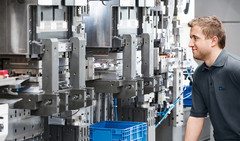Our innovative production technologies, the result of decades of experience, give us a strong competitive edge. Our made-to-measure tooling approaches let us implement virtually any customer wish.
Production processes and techniques
Spring production
Helical springs are produced by winding or coiling, and free-form springs on automatic wire bending machines. There are many types of springs, which can be distinguished on the basis of their intended function and geometry. Examples are compression springs, tension springs, torsion springs, bent-wire components and annular springs.
SCHEUERMANN + HEILIG have a large fleet of appropriate machines for efficient, cost-effective series production of technically demanding and complex springs and bent-wire parts.
Tempering and grinding processes are also integrated in the production lines. Springs made of very hard materials are tempered to relieve internal stresses induced by cold forming and improve setting. Grinding is used to shape ends.
Stamping and bending technologies
SCHEUERMANN + HEILIG have a wide range of state-of-the-art machines for making stamped and stamped + bent parts. Progressive dies and combined stamping and bending stations are used for this, including servo-controlled production systems, multi-spindle machining centres and eccentric presses. Leading-edge machine technologies permit highly precise production of complex part geometries. The automated machines and tools are modular to maximise flexibility.
The same machine can have forming systems on two sides, which can be used either separately or in combination for radial or linear production of parts or assemblies. This approach results in high efficiency and productivity. Integrated, highly automated forming and assembly processes ensure cost-effective, reliable series production of complex assemblies. The most important automated processes are:
- Thread cutting and shaping
- Assembly using screws or bolts
- Clinching
- Various welding processes, including laser, resistance and contact welding
- Riveting
- Magazining
Assemblies
SCHEUERMANN + HEILIG use highly automated forming and joining processes to make complex assemblies. The possibilities for producing – and combining – stamped and stamped + bent parts, springs and plastic components are virtually endless. The resulting assemblies are more than the sum of their individual parts: they ideally combine the most valuable and useful properties of the incorporated materials and parts.
Our machines for simultaneously forming on two sides permit either separate or combined radial or linear production of parts or assemblies. This results in high efficiency and productivity. Integrated, highly automated forming and assembly processes ensure cost-effective, reliable series production of complex assemblies. The most important automated processes include thread cutting and shaping, assembly using screws or bolts, clinching, welding (laser, resistance and contact welding, among others), riveting and magazining.
Plastics
SCHEUERMANN + HEILIG use high-performance plastics to make a vast range of parts, also in combination with metal as hybrid components. Metal-plastic hybrid structures are produced using either of two different processes: insert moulding (in which melted plastic is injected around a metal part in a mould) and post-moulding assembly (in which plastic is first moulded and then connected to a metal part).
Hybrid methods make it possible to make stamped and stamped + bent parts or springs and then combine them with plastic to meet special requirements. We apply our in-depth knowledge of the properties of different metals and plastics to join them and create a new, perfectly suited unit. This approach can be used to, for example, combine the strength of a metal part with the low weight of a plastic component. We use all common thermoplastics for these applications, both reinforced and unreinforced.
Downstream processing
Stamped and formed products can also be processed further to give them additional properties as wished. SCHEUERMANN + HEILIG offer the following:
- Heat treatment
- Cleaning
- Vibratory finishing
- Surface enhancement
- Tape and reel
- Production under cleanroom conditions
Our large repertoire of follow-up processing methods ideally prepares us to meet any wish.


